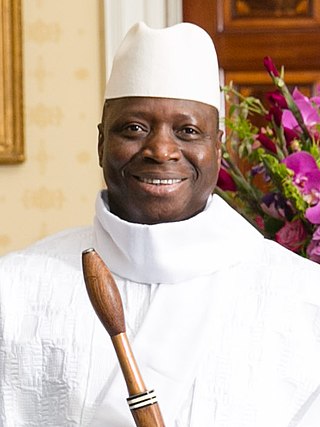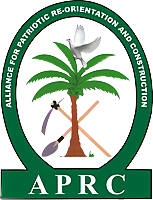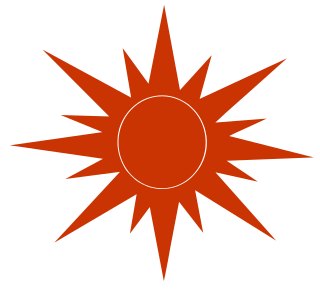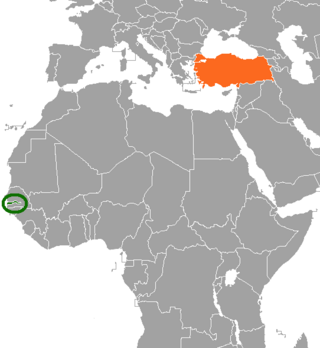
The Gambia, officially the Republic of The Gambia, is a country in West Africa. It is the smallest country within mainland Africa and is surrounded by Senegal, except for its western coast on the Atlantic Ocean. The Gambia is situated on both sides of the lower reaches of the Gambia River, the nation's namesake, which flows through the centre of the Gambia and empties into the Atlantic Ocean, thus the long shape of the country. It has an area of 11,300 square kilometres (4,400 sq mi) with a population of 1,857,181 as of the April 2013 census. Banjul is the Gambian capital and the country's largest metropolitan area, while the largest cities are Serekunda and Brikama.

Politics of The Gambia takes place within the framework of a presidential republic, whereby the President of The Gambia is both head of state and head of government, and of a multi-party system. Executive power is exercised by the government. Legislative power is vested in both the government and parliaments.
The first written records of the region come from Arab traders in the 9th and 10th centuries. In medieval times, the region was dominated by the Trans-Saharan trade and was ruled by the Mali Empire. In the 16th century, the region came to be ruled by the Songhai Empire. The first Europeans to visit the Gambia River were the Portuguese in the 15th century, in 1445, who attempted to settle on the river banks, but no settlement of significant size was established. Descendants of the Portuguese settlers remained until the 18th century. In the late 16th century, English merchants attempted to begin a trade with the Gambia, reporting that it was "a river of secret trade and riches concealed by the Portuguese."

Yahya Abdul-Aziz Jemus Junkung Jammeh is a Gambian politician and former military officer who was the leader of The Gambia from 1994 to 2017, firstly as chairman of the Armed Forces Provisional Ruling Council (AFPRC) from 1994 to 1996 and then as President of the Gambia from 1996 to 2017.

The United Democratic Party is a political party in the Gambia, founded in 1996 by 3 political parties and choose the human rights lawyer, freedom fighter, ANM Ousainou Darboe to be the party leader and Secretary General. As a candidate in the presidential election of 18 October 2001, he came second with 32.6% of the popular vote; he took second place again in the 22 September 2006 presidential election with 26.7% of the vote. The 17 January 2002 parliamentary election was boycotted by the party. In the 25 January 2007 parliamentary election, the party won four out of 48 seats.

The Alliance for Patriotic Reorientation and Construction (APRC) is a political party in The Gambia. Founded by army officers who staged a coup in 1994, it was the dominant ruling party from 1996 until 2016 with president Yahya Jammeh.

The People's Democratic Organisation for Independence and Socialism (PDOIS) is a socialist political party in the Gambia. Since 2005, it has been part of the National Alliance for Democracy and Development (NADD). It was part of Coalition 2016 in the 2016 presidential election, whose candidate, Adama Barrow, defeated long-time incumbent Yahya Jammeh. The PDOIS also publishes a party newspaper, Foroyaa, which was noted for its opposition to the Jammeh regime.

The People's Progressive Party is a political party in the Gambia. It was the dominant ruling party of the House of Representatives and the presidency from 1962 to 1994. The president throughout this time period was Dawda Jawara. The People's Progressive Party lost power after the 1994 Gambian coup d'état, a military coup led by young, junior military officers. The Alliance for Patriotic Reorientation and Construction (APRC) then became the dominant party of the Gambia. The People's Progressive Party remains active, but lacking the same level of support it garnered in the 20th century.

The National Assembly of the Gambia is the unicameral legislature of the Gambia. The authorisation for the National Assembly lies in Chapter VII of the Constitution of the Gambia. It is composed of 53 members directly elected through first past the post, and a further five members appointed by the President.
Sheriff Mustapha Dibba was a veteran Gambian politician who was the 1st Vice-President of the Gambia (1970–1972) and also served as the country's National Assembly speaker from 2002 to 2006. He was also leader of the National Convention Party (NCP).

Halifa Sallah is a Gambian politician who is currently a member of the National Assembly representing Serekunda, and the secretary-general of the People's Democratic Organisation for Independence and Socialism (PDOIS). He served as a spokesman and advisor to President Adama Barrow from during the 2016 presidential election campaign until March 2017.

Hamat Ngai Kumba Bah is a Gambian politician who is the current Minister of Tourism and Culture in President Adama Barrow's cabinet. He is also the leader of the National Reconciliation Party (NRP) and has been a presidential candidate in 1996, 2001 and 2011. He was the National Assembly Member for Upper Saloum from 1997 to 2005.

The Armed Forces Provisional Ruling Council (AFPRC) gained control of Gambia in July 1994, in a military coup d'état. The AFPRC deposed the Dawda Jawara government and banned opposition political activity. Lieutenant Yahya Jammeh, chairman of the AFPRC, became head of state. A few months later, Captain Sadibou Hydara, who was the spokesperson of the AFPRC, and Captain Sabali, deputy leader of the AFPRC, were accused by Jammeh of plotting a coup. Both men were arrested and detained at the maximum prison. Captain Hydara was tortured and killed in prison. It was believed that Captain Hydara who was the most educated among the original members of the AFPRC was in favor of returning the country to civilian rule, and strongly objected to Jammeh's candidacy.

A constitutional referendum was held in the Gambia on 8 August 1996. The new constitution was approved by 70% of voters, with a voter turnout of 87%.

Presidential elections were held in the Gambia on 29 September 1996. The first since the 1994 military coup led by Yahya Jammeh, they were also the first elections to be held under the new constitution, and the first presidential elections held separately from parliamentary elections. Voter turnout was exceptionally high, with 88% of the 446,541 registered voters voting.

In the 1994 Gambian coup d'état, a group of soldiers led by 29-year-old Lieutenant Yahya Jammeh seized power in a bloodless coup d'état on the morning of 22 July, ousting Dawda Jawara, who had been President of The Gambia since its independence in 1970.

Presidential elections were held in The Gambia on 1 December 2016. In a surprise result, opposition candidate Adama Barrow defeated long-term incumbent Yahya Jammeh. The election marked the first change of presidency in The Gambia since a military coup in 1994, and the first transfer of power by popular election since independence from the United Kingdom in 1965.

Adama Barrow is a Gambian politician and real estate developer who has served as President of the Gambia since 2017.

Gambia–Turkey relations are the foreign relations between Gambia and Turkey.

Presidential elections were held in the Gambia on 4 December 2021. The result was a victory for incumbent President Adama Barrow of the National People's Party, who received 53% of the vote, defeating five other candidates.














